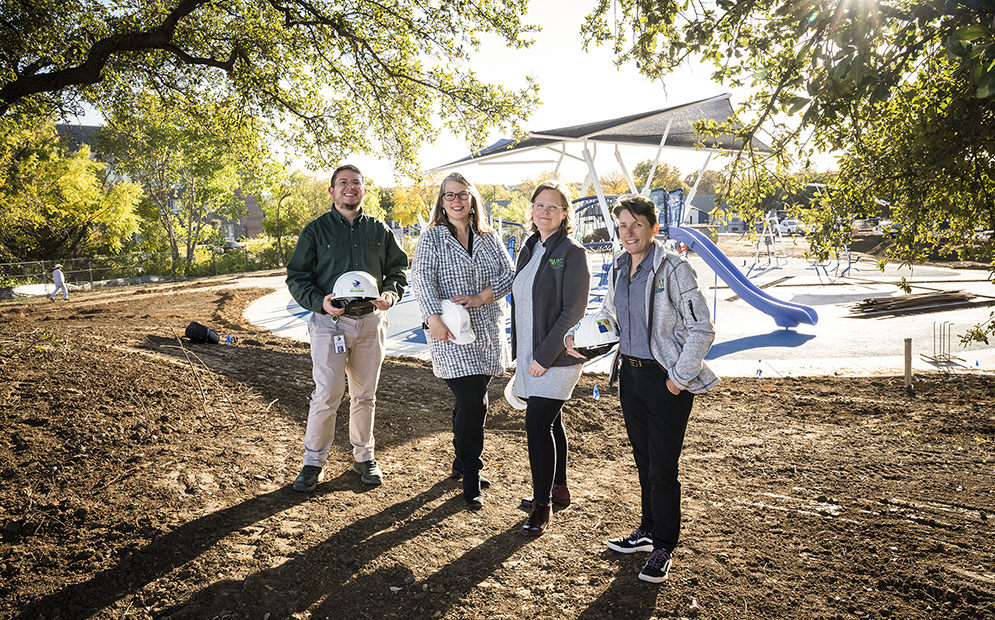Designing Greenspaces
April 10, 2024
UNT researchers collaborate with city of Lewisville to provide equitable park access.
BY BESS WHITBY
Cover photo courtesy of city of Lewisville

UNT researchers and representatives from the city of Lewisville stand in front of
Parque la Gloria, or Glory Park. (Photo: Ahna Hubnik/UNT)
From a young age, Jose Marines (’22) knew he wanted to make the world a better place. When UNT introduced its undergraduate urban policy and planning degree program in 2019, Marines was among the first to enroll.
“I’ve been interested in urban planning for a long time,” Marines says. “I always knew I wanted to improve public spaces.”
As a research assistant for UNT’s Advanced Environmental Research Institute (AERI), Marines had the opportunity to fulfill that calling. He worked on a team of AERI researchers — including faculty and other students in public administration and geography and the environment — to help plan and develop a new park for the city of Lewisville, a community about 16 miles southeast of the UNT campus in Denton. It’s one of many ways AERI research has brought environmental solutions to communities.
The interdisciplinary research institute unites faculty, staff and students from across the university to work together on projects focused on mitigating environmental problems ranging from air and water quality to urban planning, public health and conservation biology.
AERI has long worked with the city on the Lewisville Lake Environmental Learning Area, a nature preserve that serves as a living lab for environmental research and offers educational opportunities to the public. At a 2020 meeting, AERI faculty and city leadership discussed a new collaboration that would help Lewisville’s desire to improve access to greenspace and infrastructure for its residents. Plans to build a park in the high-density Triangle neighborhood quickly took shape. “It’s impressive to see how strong community relationships can snowball into collaborations,” says Lauren Fischer, an assistant professor in UNT’s Department of Public Administration who serves as AERI’s associate director. “It provides even more opportunities for our students to get out in the world and apply what they’re learning in the classroom.”
It’s impressive to see how strong community relationships can snowball into collaborations
Lauren Fischer
For Marines’ part, he conducted walkability studies and environmental monitoring — research that became his passion. “I was excited by the opportunity to provide baseline data on environmental conditions and look at how it progressed,” he says. “Looking at real change and tracking environmental health was interesting to me.”
Marines also helped Fischer and a team of other students host community engagement events in Lewisville to gather direct input from residents on possible improvements to city parks and trails.
Lu Liang, a former associate professor in UNT’s Department of Geography and the Environment, assembled researchers to conduct tree canopy surveys and monitor heat and air quality across the city, including in the Triangle neighborhood. “Air pollution is always a public health concern because of population and vehicle density,” Liang says. “Everything can be intensified in a compact urban setting without access to parks and greenspace.”
The team’s research revealed moderate air pollution levels and higher than normal ambient temperatures at the park site. However, AERI determined that continued air monitoring and the introduction of native trees and plants would ultimately offset these issues.
The team’s efforts led to the 2.85-acre Parque la Gloria, or Glory Park, which is currently under development in Lewisville’s Triangle neighborhood. The park will include a playground and open play space, fitness equipment, shade structures and benches as well as an onsite food market.
Impressed by AERI’s thoughtful expertise, Lewisville city leadership invited AERI faculty and students — including Marines — to collaborate on the city’s Healthy Infrastructure Plan adopted in 2023. The master plan, which has won awards from the North Central Texas Council of Governments, the Texas chapter of the American Planning Association and the Texas Recreation and Park Society, includes an equity index to improve infrastructure in parts of the city that need it most.
Marines’ commitment to helping others has only begun. He now works for Lewisville’s parks and recreation department while pursuing a master’s degree in public administration at UNT.
“Urban planners are problem solvers. We look at situations and see how we can do better,” Marines says. “UNT gave me the tools to take on these problems.”